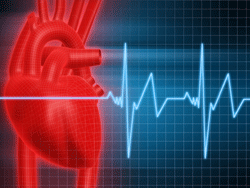What causes irregular heart beat? – Learn about heart disease.
 Here’s another question I asked Dr. Cynthia Shelby-Lane and her answer about causes irregular heart beat.
Here’s another question I asked Dr. Cynthia Shelby-Lane and her answer about causes irregular heart beat.
Lisa Nelson: What do you recommend for individuals experiencing heart palpitations and what may be triggering the problem?
Dr. Shelby-Lane: Arrhythmias are any deviations in the normal rhythm of the heart (heartbeat). They usually occur as a result of interference with the electrical pathways that produce the heart’s rhythmic muscular contractions. The Parasympathetic Nervous System is responsible for slowing down the heartbeat rate. The Beta-1 Adrenergic Receptors of the Beta-Adrenergic Nervous System are responsible for speeding up the heartbeat rate.
If you experience the following symptoms, you may need to be evaluated for toxicity and consider a stress test, echocardiogram, holter monitor or a tilt table test for further evaluation and diagnosis. A neurologic evaluation may also be indicated.
Fluttering or pounding in the heart
Hemodynamic disturbances are potentially life-threatening such as bradycardia and tachycardia
Dizziness
Syncope (fainting)
Unusual awareness of the heart
Anxiety
Abnormal ECG (provides a “one-shot” picture of the electrical activity of the heart)
Holter 24-hour monitoring results (Holter monitors look at the heart for a longer period of time and are necessary to detect intermittent rhythm problems.
Possible Causes Irregular Heart Beat, Contributing or Associated Factors
1. Coronary artery disease
2. Hypertension
3. Adverse drug reactions
4. Endocrine imbalances, especially thyroid or adrenal disorders
5. Myocardial tissue disease (valvular, atrial and ventricular abnormalities)
6. Sequela of rheumatic fever
7. Metabolic disorders
8. Nutritional deficiencies, especially magnesium
9. Caffeine
10. Environmental toxins or food allergies
11. Damaged conductive tissue (neurocardiogenic syncope)
12. toxicities
13. anxiety and stress disorders, etc.
Follow up diagnostic testing is recommended to determine if the above conditions are causing the problem.
Heart disturbances can occur as a symptom of magnesium deficiency: Measuring your red blood cell magnesium can give you a good idea of your actual magnesium level.
All the best,
Lisa Nelson RD
Heart Healthy Tips
Heart Disease and Fibromyalgia – Is there a link?
Here’s another question I asked Dr. Cynthia Shelby-Lane and her answer.
Lisa Nelson RD: Do you feel there is a link between heart disease and fibromyalgia?
Dr. Shelby-Lane: Fibromyalgia symptoms were akin to the symptoms of several “functional” disorders (i.e., medical conditions that affect bodily function via causes that are poorly understood) including recurrent non-heart-related chest pain, heartburn, heart palpitations and irritable bowel syndrome. However, a number of studies since have detected evidence of abnormalities in the internal organs of many fibromyalgia patients, including heart valve problems, malfunction of the muscles that move food to the stomach, and weakened lung function. These studies suggest that the abnormalities likely are symptoms of a larger disease, not illnesses by themselves.
Because of weakened respiratory muscles an individual finds it hard to breathe and the supply of oxygen to heart is decreased resulting in the above symptoms. Similar is the case with neck pain, due to weakened muscles.
Fibromyalgia (FM) is a recently recognized disorder rheumatologists and practitioners see quite often, especially in women 20 to 50 years old. It is characterized by widespread, chronic musculoskeletal pain, tenderness, fatigue and stiffness affecting muscles, tendons, ligaments and connective tissues with loss of sleep, depression, and shortness of breath. It is a poorly understood condition and there appears to be no universal cause and no single treatment that is effective for every person. Diagnosis of fibromyalgia is based on the tenderness of specific anatomical sites (at least 11 of 18 points) and pain in all four quadrants of the body that has lasted for 3-6 months or longer. It mostly affects the neck, shoulders, lower back, chest and/or thighs. Fibromyalgia patients meet many of the diagnostic criteria for chronic fatigue syndrome. Three to six million people are affected by fibromyalgia.
Possible Causes or Contributing Factors of Fatigue & Fibromyalgia
The cause of fibromyalgia is not known. Patients experience pain in response to stimuli that are normally not perceived as painful. Researchers have found elevated levels of a nerve chemical signal, called substance P, and nerve growth factor in the spinal fluid of fibromyalgia patients. The brain nerve chemical serotonin is also relatively low in patients with fibromyalgia. Studies of pain in fibromyalgia have suggested that the central nervous system (brain) may be somehow supersensitive. Scientists note that there seems to be a diffuse disturbance of pain perception in patients with fibromyalgia.
Also, patients with fibromyalgia have impaired non-Rapid-Eye-Movement, or non-REM, sleep phase (which likely explains the common feature of waking up fatigued and unrefreshed in these patients). The onset of fibromyalgia has been associated with psychological distress, trauma, and infection.
Fibromyalgia can occur in the presence of other conditions such as rheumatoid arthritis, osteoarthritis and hypothyroidism.
Nutritional therapies that help with fibromyalgia are D-ribose, L carnitine, magnesium, coenzyme Q 10, glutamine, fixated nitrogen, SAMe (optimal dosages vary for all supplements) and detoxification, but detection and correction of the underlying problem is the first course of action. This should also include hormone evaluation for adrenal and thyroid problems.
All the best,
Lisa Nelson RD
Be Heart Healthy and Lose Weight



